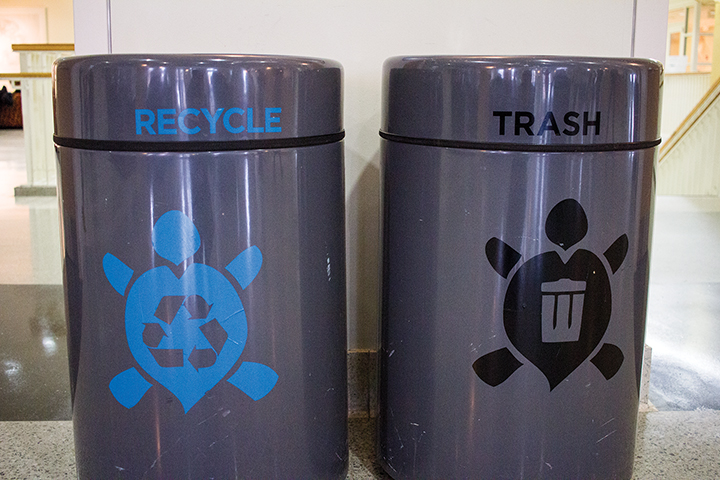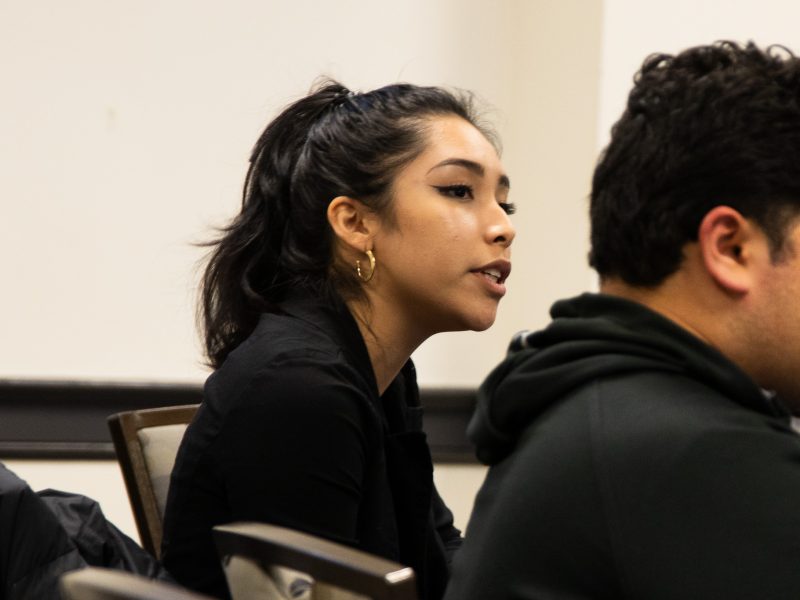At this year’s annual RecycleMania, the University of Maryland improved in every category, and took home first place in categories for Maryland.
This is the university’s eighth year competing in RecycleMania, a competition where universities and colleges across the country and Canada record and compare how much recycled material they collect over an eight-week period.
The competition’s categories include: per capita classic (largest combined paper, cardboard, bottles and cans on a per person basis), the gorilla prize (the highest total capacity of recycled paper, cardboard, bottles and cans regardless of population), waste minimization, grand champion (the combination of trash to find a percentage of a school’s overall waste generation) and food service organics (the tracking food waste). The university ranked first for the state of Maryland in food organics and in the gorilla prize category, said Adrienne Small, recycling specialist in this university’s facilities management.
This year, the university ranked 53 out of 166 — within the top-third — of those participating in food organics, whereas last year they ranked 73 out of 147, or within the top-half, Small said. Last year, the university also took home first place for the gorilla prize category in Maryland.
Small said the university improved in every single category this year. This improvement was due to focusing on a specific ‘Clean the Stream’ theme for this year’s competition. This specific focus worked better for the university, rather than just generally emphasizing recycling, which is what the university has done in previous years, Small said.
“[The theme] was talking about the recycling stream, and so we really focused on improving the quality of the materials that go in there instead of just looking at volume and getting as much as possible,” Small said. “We are looking to make sure people are only putting the correct materials in there.”
With the help of the Office of Sustainability and Facilities Management, the “Clean the Stream 2016” program educated the campus about plastic bags, Styrofoam, small plastic items and liquids, by having information available online about how to sort waste correctly and creating a video competition where students can teach each other how to recycle properly, Small said.
“Our message was to keep these materials out of the recycling bin, that they are not recyclable,” she said. “That was actually probably my favorite part this year, that we did have a specific theme.”
Creating a theme was not required by the national RecycleMania competition, but Andrew Muir, a spokesman for the Office of Sustainability, said they wanted to get focus on a single message to get it through the campus.
“Being able to raise awareness about this was really exciting for us because we always like being able to encourage people to take pride in their recycling and recycle as much as possible,” Muir said. “But I think it’s really important for people to also realize that you need to be recycling properly as well.”
The university also wanted to have more student involvement, so they created a video contest three years ago. Students can submit a recycling-related video to be entered into a competition to win a prize, said Bill Guididas, executive director of building and landscape maintenance.
“Watching those entries and being one of the panelists to judge those entries was a really fun thing for me,” Guididas said.
Senior communications major Shannon Cooper was announced this year’s winner of the video competition on Friday’s Earth Day Festival. Cooper received received $500 in Terrapin Express points and her video will be shown at a men’s basketball game next year.
Sophomore Maggie Wartman, who helped the Office of Sustainability advertise RecycleMania, said the competition is meant to raise awareness, and she said she hopes students will continue to practice good recycling habits now that the competition is over.
“I’m excited to see how students are getting more involved with recycling and reducing their waste because it’s such a big issue,” said Wartman, an environmental science and policy major.



